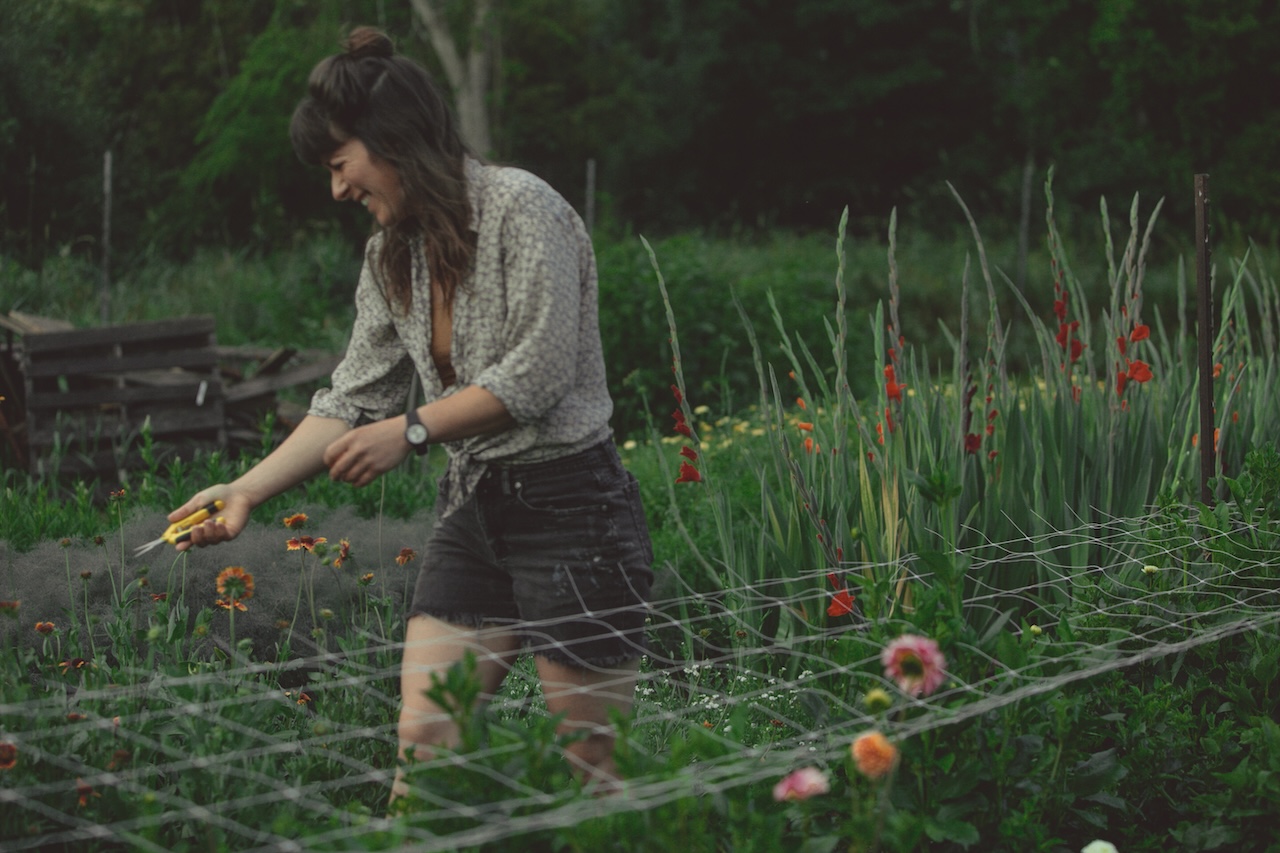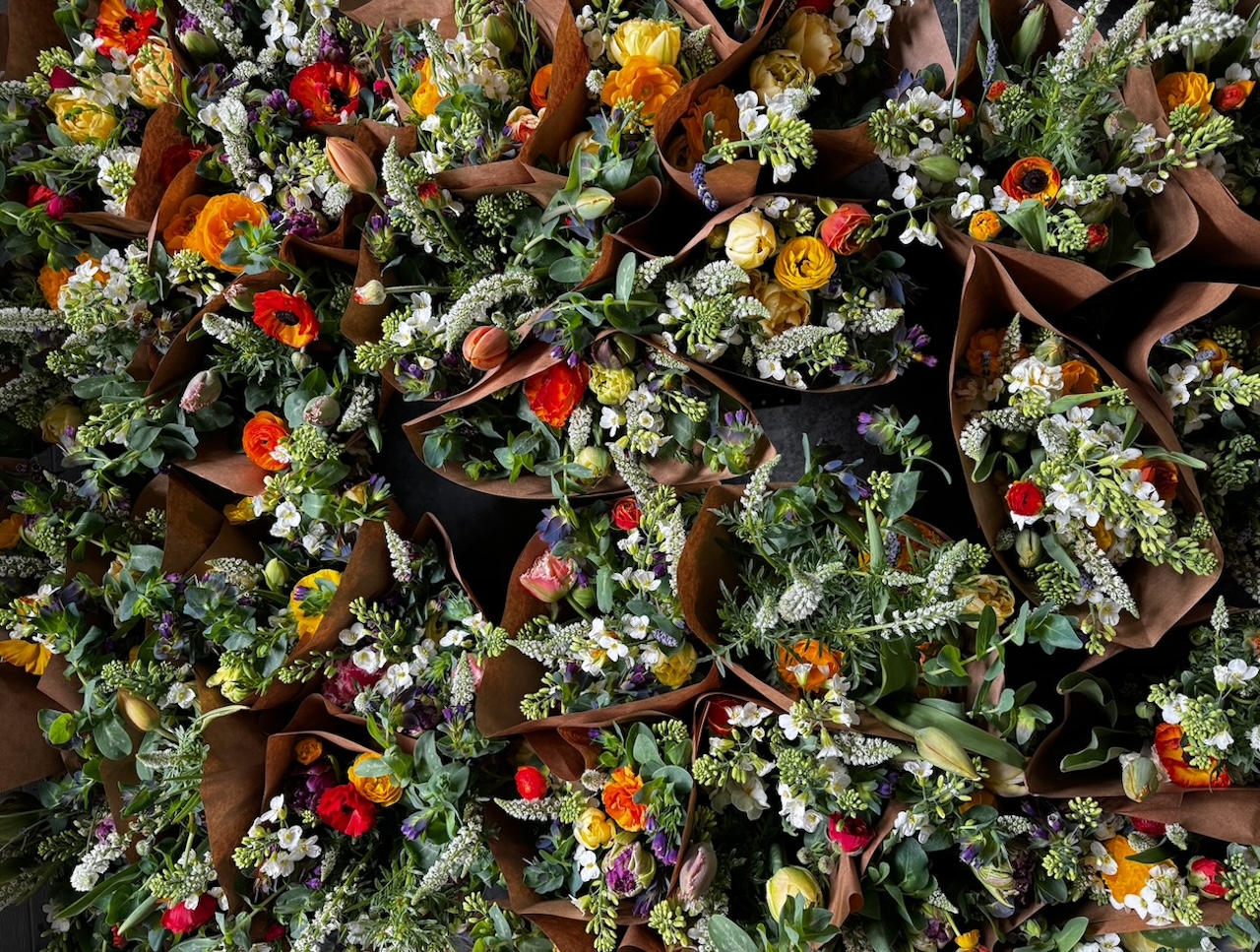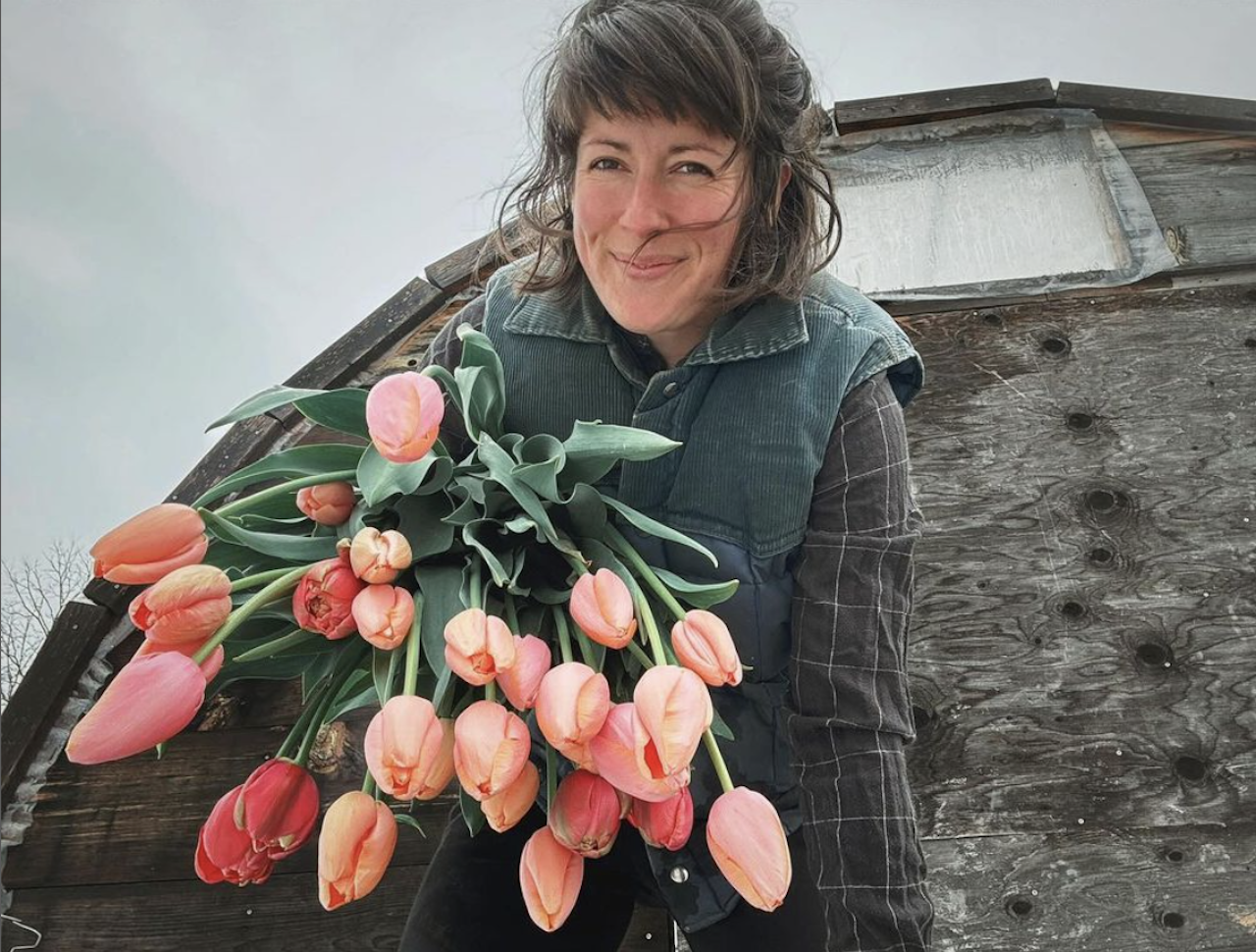Our Environment, Animal Tips & the Great Outdoors

Foxtrot Farm & Flowers Emphasizes Sustainable Blooms
Since childhood, Kate Farrar has been surrounded by flowers.
“I grew up growing flowers with my family and working in the gardens, and now I’ve returned to growing flowers again,” she said.
Kate has been farming in the Hudson Valley for over ten years. She worked on a variety of farms in the Germantown/Hudson area before purchasing land in Stanfordville in 2020.
“I wanted to make sure that before I started a business, I had land security. Land equity is like our security net in farming, so that was really important. Once I was able to purchase land, I was able to fully envision Foxtrot Farm & Flowers,” she said.
Why Foxtrot, you ask? The name is multi-layered for Kate. For one, it’s inspired by her dog and muse, Pepper. “She sort of hunts like a fox.” It’s also an ode to the dance itself.
“I started a business in 2018 and I ended up losing my land within a year due to a handshake agreement. I learned from that, but it felt a lot like the dance, the foxtrot, in that it was two steps forward, two steps to the side, and then two steps forward again,” she explained. “It was a bit of an homage to the process of landing here.”
Regenerative farming
Though Foxtrot encompasses five acres, Kate only uses one acre to farm. She has the farm split into multiple fields, a greenhouse tent, and a grow tunnel that she worked closely with the Department of Natural Resources and Conversation to install.

The tunnel extends Foxtrot’s season by at least a month at either end of the season, which is vital for a seasonal business. Kate finished building the tunnel in December of 2023, so she wasn’t able to use it to the fullest extent for this growing season. If she had been able to start fall-planted annual flowers, she said that she would already be deep into harvesting for the upcoming season.
The tunnel still came in handy, however, as she was able to plant a lot earlier this spring than normal and get a jump on the season, which means she’ll be able to get blooms a lot earlier.
Foxtrot is also a no-till farm; “There’s a lot of things I don’t like about tillage. It creates a massive amount of soil disruption, which inevitably blasts the microbiology of the soil. It can create compaction in the soil and cause erosion.”
Instead, Foxtrot utilizes black silage tarps, which essentially uses the power of the sun to solarize the plant structure. For example, Kate uses the tarps on overwintered cover crops in order to kill the crop and create a mulch-like layer. This way, she hasn’t disrupted the soil nearly as much as if she tilled instead.
“I think regenerative is a word that’s being thrown around a lot, and I think it means different things to different people,” she said. “The way I like to think of it is that we as humans can have a positive or negative impact on the spaces that we inhabit. With intentional human impact, you can create more biodiversity of plants, you can improve soil, and you can restore the parcel of land that you’re stewarding.”
On part of the remaining four acres, she’s planting a variety of native plants to give the landscape an ecological boost. A creek lies at the back of the farm, and part of the motivation for planting the meadowscape was to surround the stream and protect it from eroding. The goal overall is to create a more resilient environment by supporting it from the ground up.
As far as soil amendments go, Kate creates her own through a fermentation process. Fermented plant juices are made from a mixture of plant material, water, and sugar.
“The concept is that you don’t need to buy fertilizer and all of the fertility that your soil needs is right here. Fermentations extract the minerals that you want to put back into the soil,” she explained. “I’m trying to be really thoughtful about what I’m putting in the soil and how I’m caring for the plants.”
She doesn’t spray toxic chemicals in the fields, nor does she utilize chemicals post-harvest in terms of flower preservation. “It’s a matter of making it safe for the environment and for customers. And for me too, because I have to handle them all day long.”
Events & workshops
From the beginning, Kate knew that she wanted to bring the community to the farm for special events and workshops. For the past three years, she’s been curating space at the farm to host a larger number of people. This past winter, she finished renovating the barn on the property to create an event space that can host up to 100 people.
“Because farming is so solitary, I love hosting people on the farm,” she said. “Also, farming is very interesting, but I don’t think it’s the full span of all of my interests. It’s been so fun to collaborate with other artists, farmers, chefs, musicians, and many more.”
Foxtrot has a busy event schedule for the summer season. In addition to a variety of guest chefs and intimate concerts, Foxtrot is also hosting a Summer Solstice with Westerly Canteen on Thursday, June 20 and Upstate Art Weekend with Charlotte Woolf on Thursday, July 18.
“One of my friends will also be hosting some yoga classes here as well, which I’m really excited about. They’re going to be offered on a sliding scale, because yoga can be very financially exclusive in a way,” she explained. “I also would love to make flowers more economical for people, so on the nights that we host yoga, I’ll be doing a sliding scale on bouquets. It’ll be an evening where people can come as they are and pay what they can.”

Floral design + CSA
Foxtrot designs flowers for weddings, feasts, festivities, and everyday delights. Additionally, this year, Foxtrot will be selling bouquets every Saturday at the Millerton Farmers Market and has a spring, summer, and fall CSA (community supported agriculture) program.
While shares for the spring and summer CSAs are sold out, Foxtrot still has open slots for the fall CSA. The fall CSA is a five-week share that features heirloom chrysanthemums, dahlias, and snapdragons, among other fall foliage.
Flowers are also available through Foxtrot’s online store for pickup in Stanfordville and local delivery within a 30-minute radius of the farm. From April to December, the flowers are sourced entirely from the farm and thus, flowers for the arrangement are the farmer’s choice. Varieties change from week to week, but if you have a preferred color palette, you can let them know in the order form.
As far as floral design goes, Kate favors a wild, natural aesthetic.
“I’m using unusual foliage and I like to let the flowers remain in the shape that they want to be in. I’m not someone who has been classically trained in arranging flowers where you arrange them all into this beautiful dome to make a bouquet,” she explained. “I want to make sure that there’s a lot of air in the arrangements and that each flower is given space to be its most beautiful self and not jammed in against the other flowers.”
Lessons from the land
Now in her third season, Kate has certainly learned a lot about running a business and farming the land.

First, she stated that there is a “huge” difference between working for someone else and running a business on your own. “You’re not just managing the fields or harvest, you’re managing relationships, promotion, planning, and finances. You wear many hats and I’ve been figuring out how to balance that and learn how to create a schedule for myself,” she said.
Kate has also created a relationship with the land, which is one of the most special parts of her work. When she first purchased the land, she conducted a soil test, and the overall soil health results were less than average.
“Last year when I did the soil test in the fall, the results came back at least 25 or off the charts, which is great. When soil health is good, plant health is good and they’re more resilient from pests,” she said. “The health and vitality of the plants are really strong right now and that’s been a process that I’ve been a part of. That’s exciting.”
When she’s deciding on what to plant, she utilizes a mix of what she knows people want to see in their arrangements and bouquets – such as dahlias, snapdragons, cosmos, sunflowers, and chrysanthemums – while also adding in plants that have unusual foliage and mood.
“I’m also doing research and sourcing some weird plants that you can’t really find locally. There’s so many flower farms and farms in general, which we’re so lucky to have, but for me, it’s important to have a niche for Foxtrot moving forward.”
Speaking of moving forward, Kate is looking to plant more perennials going forward to aid in preserving the soil structure. “I feel called to that investment and those kinds of plants. I think that decision will help shape the business, help me refine what I grow, and decide on the specialty of the farm,” she said.
She’s also interested in hosting more events and cultivating relationships with creators in the area. Her goal is to be able to host events and workshops year-round now that the barn is finished.
“I love the responsibility of caring for this place,” Kate said. “I’m looking forward to continuing to grow and learn.”
To learn more about Foxtrot Farm & Flowers, visit them in person at 6862 Route 82, Stanfordville, NY 12581, visit their website here, and follow them on Instagram @foxtrotfarmflowers.



